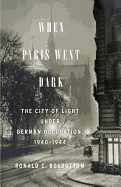
When Nazi troops marched into Paris in June 1940, the city surrendered without firing a shot. In When Paris Went Dark: The City of Light Under German Occupation, 1940-1944, historian Ronald C. Rosbottom explores face-to-face interactions between the occupiers and the occupied, the effect of the Occupation on daily life in Paris, its psychological and emotional impact on Parisians and its legacy of guilt and myth.
Drawing from sources that include official records, memoirs, interviews and ephemera, Rosbottom tells a story that is more complicated than a simple choice between courageous resistance or collaboration, though he offers examples of both. He discusses the distinction between individual acts of resistance and the Resistance, and how the French and the Germans both used the hide-and-seek possibilities of the iconic Parisian apartment building. He considers the act of waiting in line both as an illustration of the difficulties of everyday life and as a replacement for forbidden political gatherings. Above all, he describes the Occupation as gradual constriction of Parisian life within ever-narrowing boundaries.
Rosbottom does not limit his discussion to the Parisian perspective. Some of the most interesting sections of When Paris Went Dark deal with the German experience in the city, a complex mixture of tourism, conquest, envy and isolation. His account of Hitler's early-morning tour of the capital soon after its surrender is particularly illuminating about the Nazi leader's ambivalence toward cities in general and Paris in particular.
When Paris Went Dark is an important and accessible addition to the social history of World War II. --Pamela Toler, blogging at History in the Margins

